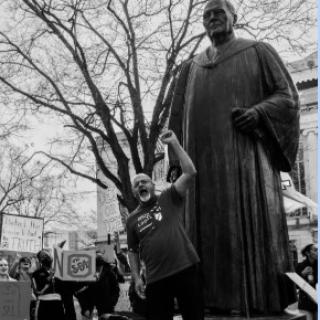Advertisement
I tell the students in my African American History Post-Emancipation class that the blinding of Sgt. Isaac Woodard is the police beating that time forgot. Woodard had been discharged from the United States Army in 1946. A decorated veteran, he left Camp Gordon in Augusta, Georgia, on his journey home. A short distance from Augusta, there was a rest stop, and Woodard asked if he had time to visit the restroom. He and the driver exchanged words, but he was allowed to go. In Batesburg, near Aiken, Georgia, the drive stopped, notified the police, and Woodward was put off the bus. Several police asked Woodard for his discharge papers, and then took him to an alley nearby and beat him. He was then arrested for disorderly conduct and put in jail. During the night, Lynwood Shull, the chief of police jammed Woodard in the eyes with the end of his nightstick, allegedly because he said yes, instead of yes sir.
The following morning he was taken to court, found guilty of the charge, and fined fifty dollars. Woodard asked for a doctor, but it took several days before he was seen by one. Because of the injuries to his eyes, he was transferred to a hospital in Aiken, South Carolina, but as a black man, of course, the care he received was substandard. He had amnesia in addition to the injuries from his beating, and he was totally blind. His eyes had been gouged out during the beating; both globes were damaged beyond repair. Because he was discharged five hours before the beating occurred, the government declined to grant him disability payments. In spite of witnesses who contradicted the stories of law enforcement officials and the physical evidence presented, segregation won the day–as it always did then–and Shull was acquitted. J. Waites Waring was the presiding judge.
Isaac Woodward was one of thousands of African American servicemen who returned home to the south after World War I and World War II, and were attacked, beaten, killed, and lynched; some of them while still in their uniforms. Some of the lynchings were especially horrific. Black veterans were hacked to death, killed with blow torches, castrated, and relieved of their digits; their clothing was ripped off and handed out as souvenirs. Returning black veterans were the South’s worst nightmare; they were armed black men. Moreover, these men had proven themselves in battle, and fought two wars–against racism at home and fascism abroad. Some had been trained as officers and exercised authority–albeit over black servicemen–and were unwilling to return to an America that didn’t recognize their rights.
Waring was appalled at the verdict. How could such an egregious act of violence go unpunished? It was like starting a landslide in his mind; it made him question everything he ever thought about race. He and his wife determined that they needed to educate themselves on the subject. They embarked on an intense program of “reading, discussion, and reflecting.” Their first two books were Mind of the South, by W. J. Cash, which was a searing indictment on lower class white southerners, and An American Dilemma: The Negro Problem and Modern Democracy, by the Swedish sociologist Gunnar Myrdal. This meaty tome was a study of blacks and whites in America. Both books had a profound effect on his conscience and judicial philosophy, and he began looking for civil rights cases that were filed in his district, and made sure they were put on his docket. He slowly transformed himself into a judge more concerned with justice, and less with race. The personal and political price he paid for that was dear.



